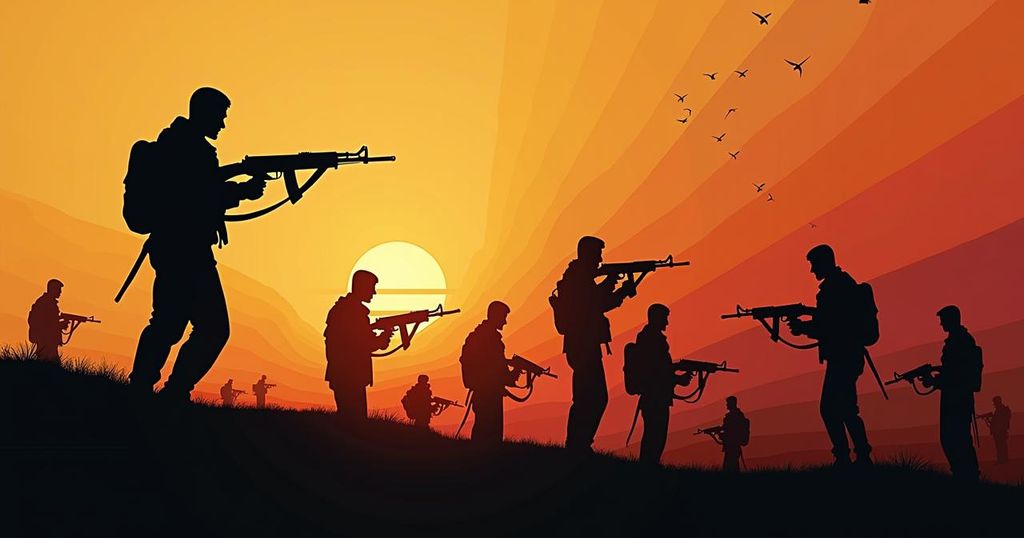Assessing the Ramifications of Hassan Nasrallah’s Assassination: Potential Responses from Hezbollah, Iran, and Israel
The assassination of Hezbollah’s leader, Hassan Nasrallah, by Israel represents a significant escalation in the ongoing conflict, potentially dragging both Iran and the US into deeper confrontations. Hezbollah may respond with retaliatory strikes, while Iran could mobilize allied militias to attack Israel and US interests. Israel, aiming to diminish Hezbollah’s capabilities, seems poised to intensify military operations despite calls for a ceasefire. Overall, the dynamics among these groups will shape the conflict’s trajectory.
The assassination of Hassan Nasrallah by Israel marks a consequential escalation in the ongoing conflict with Hezbollah, suggesting a potential shift towards a broader and more severe confrontation involving both Iran and the United States. The future developments will significantly hinge on the actions of Hezbollah, Iran, and Israel, each of which faces unique challenges and motivations in the wake of this incident. Hezbollah is currently facing severe setbacks due to the elimination of key leadership figures, having lost over a dozen top commanders. This loss, paired with the destruction of communication systems and weaponry, has rendered the organization vulnerable. However, it has publicly committed to continuing its resistance against Israel, as its members urge for retribution. With an array of long-range, precision-guided missiles still at its disposal, Hezbollah may feel compelled to launch attacks swiftly to prevent further losses. Such a move, while likely inducing a strong retaliation from Israel, could lead to catastrophic impacts on Lebanon’s infrastructure and potentially extend the conflict to include Iran. Iran, on its part, perceives this assassination as a significant blow to its influence in the region. The Iranian government has already declared a period of mourning and has initiated precautions to safeguard its leadership, particularly that of Supreme Leader Ayatollah Ali Khamenei, from potential assassination attempts. Iran’s reaction to the killing of Hassan Nasrallah will be crucial; it may activate allied militia groups across the Middle East to intensify their assaults on Israel and U.S. targets, yet it must navigate this response cautiously to avoid igniting a war which it cannot effectively wage. Israel, undeterred by the proposed 21-day ceasefire from multiple nations, is poised to continue its military operations against Hezbollah until it has effectively neutralized the perceived threat of missile attacks. Evidence suggests that the Israel Defense Forces (IDF) are preparing for a possible ground invasion to further dismantle Hezbollah’s capabilities. However, this route remains fraught with complications, as historical experiences in similar conflicts have shown that while initial incursions may be manageable, extricating forces once embedded in Lebanon may prove to be a protracted endeavor.
The ongoing conflict between Israel and Hezbollah has escalated dramatically following the assassination of Hezbollah’s leader, Hassan Nasrallah. The implications of such a significant event reverberate across the Middle East, particularly influencing the strategic calculations of Hezbollah, Israel, and Iran. Hezbollah’s weakened command structure poses serious concerns for its operational effectiveness, while Iran’s response could reshape alliances within its extensive network of militias. Israel’s military aims, grounded in the need to eliminate the threat posed by Hezbollah, signal a potential increase in hostilities in the region.
The recent assassination of Hassan Nasrallah signifies a pivotal moment in the conflict involving Hezbollah, Israel, and Iran. As each party contemplates its next moves, the potential for increased violence looms large, particularly if Hezbollah opts for missile strikes in retaliation or if Iran mobilizes its allied militias. Israel’s aggressive strategy indicates a willingness to pursue military engagements that could further escalate tensions. The situation remains fluid, and future developments will depend on the actions and reactions of these key players in a highly charged geopolitical environment.
Original Source: www.bbc.com




Post Comment